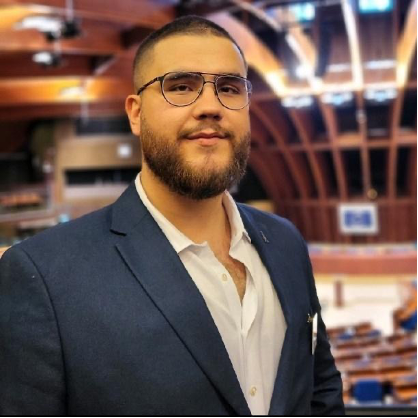19.07.2023

In today's interconnected world, the Western Balkans Mobility Agreement on Freedom of Movement with Identity Cards stands as a catalyst for transformative change, particularly for the region's youth. By promoting the exchange of people and ideas, this agreement is unlocking a myriad of benefits for young individuals across six countries. From expanded educational horizons to enhanced career prospects, cultural immersion, and fostering reconciliation, the Mobility Agreement is paving the way for a brighter future for the region's youth.
Empowering Educational Opportunities:
One of the main benefits of the Mobility Agreement is its significant effect on instructive open doors. As boundaries become more porous inside the Western Balkans, young people can immediately jump all over the opportunity to seek after advanced education in colleges and establishments across the district. Gone are the times of lumbering administrative processes and extended visa applications. By moving freely within the region only with their ID cards, undergraduates can unreservedly set out on their scholastic processes. This not just works with the trading of information and multifaceted advancement yet in addition encourages a feeling of regional solidarity and collaboration among the youngsters.
Expanded Career Prospects:
Young professionals and job seekers alike can gain access to a wide range of career opportunities through the Mobility Agreement. By empowering opportunities of development inside the Western Balkans, it facilitates admittance to the regional job market. Without being hindered by cumbersome administrative procedures, young people can now investigate employment opportunities, internships, and professional development programs in countries nearby. The creation of a dynamic and interconnected workforce in the region is made possible by this increased mobility, which also facilitates the transfer of knowledge and expertise. By widening skylines and embracing different workplaces, the Mobility Agreement enables young people to flourish in a serious work market.
Cultural Exchange and Networking:
The agreement not only facilitates physical mobility but also nurtures cultural exchange and networking among the youth. It opens doors for young individuals to participate in a plethora of cultural events, festivals, conferences, and youth forums throughout the region. These interactions foster mutual understanding, respect, and appreciation for diverse cultures, traditions, and perspectives. By breaking down barriers and promoting dialogue, the Mobility Agreement paves the way for lasting friendships and collaborations that transcend national borders. It is through these connections that the youth can collectively shape a brighter future for the entire Western Balkans region.
Entrepreneurship and Innovation:
In the digital age, entrepreneurship and innovation are vital drivers of economic growth and prosperity. The Mobility Agreement fuels these engines by facilitating cross-border business ventures and collaborations. Young entrepreneurs and innovators can now establish startups, forge partnerships, and access regional markets more easily. This newfound mobility acts as a catalyst for knowledge exchange, encourages innovation and creativity, and promotes economic development. By enabling young minds to connect, create, and disrupt traditional industries, the Mobility Agreement unleashes the entrepreneurial potential of the Western Balkans' youth.
Reconciliation:
In addition to the aforementioned benefits, the Mobility Agreement also plays a crucial role in fostering reconciliation among the countries in the Western Balkans. The region has a complex history marred by conflicts and tensions. However, by facilitating the movement of people and promoting cross-cultural experiences, the agreement contributes to healing wounds and building bridges between communities. Young individuals, who are often more open-minded and willing to engage in dialogue, can play a significant role in this process. By interacting with their peers from different countries, they can challenge stereotypes, overcome prejudices, and work together towards a shared future of peace and cooperation.
The Mobility Agreement allows young people to confront and address historical narratives and perceptions that may have fueled conflicts in the past. Through educational exchanges, cultural immersion, and collaborative projects, the youth can build relationships based on trust and understanding. By creating a sense of shared identity and fostering reconciliation at the grassroots level, the Mobility Agreement helps to break down barriers and contribute to lasting peace and stability in the region.
Economic Integration and Regional Stability:
Past the singular advantages for young people and the compromise cycle, the Mobility Agreement assumes a significant part in encouraging financial reconciliation and local dependability. By separating obstructions to development and advancing cross-line collaboration, it invigorates exchange inside the Western Balkans. As the young profit from the open doors enabled by the agreement, they add to the area's financial development and job market creation. The interconnectedness and coordinated effort cultivated by the Mobility Agreement likewise act as a powerful tool in reinforcing territorial ties, advancing harmony, and guaranteeing long haul steadiness in the Western Balkans.
Conclusion:
The Western Balkans Mobility Agreement with ID Cards addresses a wonderful achievement in the excursion towards territorial combination, compromise, and the strengthening of the young. All aspects of a young person's life, including education, career prospects, cultural exchange, and entrepreneurial endeavors, benefit from it. This agreement propels the youth of the Western Balkans toward a future filled with possibilities by removing barriers, encouraging reconciliation, and fostering a sense of unity. As they embrace the open doors that are accessible through the Mobility Agreement, the local young people will turn into the main thrust behind a prosperous, comprehensive, and interconnected Western Balkans.

Hekuran Muja, was born a refugee in Switzerland and grew up in Kosovo. He is an Expert of International Relations, European Integration specialist, currently working to promote democracy in the education system with the strengthening of local and the National Student Council of Kosovo. While engaging with the Kosovar Youth Council, he was also able to advocate for youth participation in decision-making and youth advocacy, helping the government draft policies and laws, and representing his country internationally in numerous events.